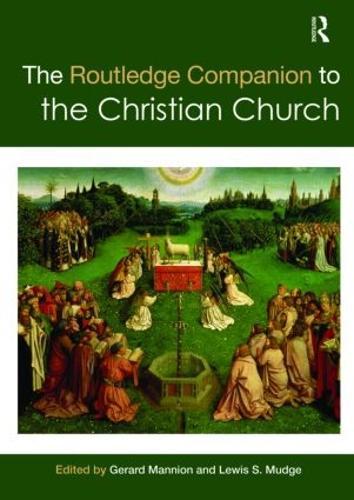Overview
The nature and story of the Christian church is immensely important to theology students and scholars alike. Written by an international team of distinguished scholars, this comprehensive book introduces students to the fundamental historical, systematic, moral and ecclesiological aspects of the study of the church, as well as serving as a resource for scholars engaging in ecclesiological debates on a wide variety of issues. It divides into six parts: the church in its historical context the different denominational traditions global perspectives methods and debates in ecclesiology key concepts and themes ecclesiology and other disciplines: social sciences, philosophy, literature and film. Authoritative, accessible and easily navigable, this book is indispensable for everyone interested in the nature and history of the Christian Church.
Full Product Details
Author: Gerard Mannion (University of San Diego, USA) ,
Lewis S. Mudge (San Francisco Theological Seminary and the Graduate Theological Union, USA)
Publisher: Taylor & Francis Ltd
Imprint: Routledge
Dimensions:
Width: 17.40cm
, Height: 4.10cm
, Length: 24.60cm
Weight: 1.300kg
ISBN: 9780415567688
ISBN 10: 0415567688
Pages: 704
Publication Date: 22 February 2010
Audience:
College/higher education
,
Tertiary & Higher Education
,
Undergraduate
Format: Paperback
Publisher's Status: Active
Availability: In Print

This item will be ordered in for you from one of our suppliers. Upon receipt, we will promptly dispatch it out to you. For in store availability, please contact us.
Reviews
'I am glad to commend the 'Routledge Companion to the Christian Church'. It is good that students will get a deeper knowledge of the meaning of ecclesiology and of its crucial importance for mutual understanding and ecumenical dialogue.' -- Cormac Murphy O'Connor, Archbishop Emeritus of Westminster 'it is a valuable compendium of information and should be an important part of a good reference collection.' -- Choice 'Good companions add value to any journey. They help us to spot landmarks on the way, explain a few things, and indicate possible ways ahead. Those who journey with the Christian Church through time and space benefit from just such good companions, and Gerard Mannion and Lewis Mudge are to be congratu-lated on their oversight of this significant project in ecclesial studies.' -- Church Times
Author Information
Gerard Mannion is Director of the Centre for the Study of Contemporary Ecclesiology at Liverpool Hope University where he is also Professor of Ecclesiology and Ethics and Co-director of the Applied Ethics Initiative. His numerous publications include Schopenhauer, Religion and Morality (2003), Readings in Church Authority: Gifts and Challenges for Contemporary Catholicism (co-editor) (2003), and Ecclesiology and Postmodernity -- Questions for the Church in Our Times (2007). Lewis S. Mudge is Robert Leighton Stuart Professor of Theology, Emeritus, at San Francisco Theological Seminary and the Graduate Theological Union, Berkeley, USA. He is the author of One Church: Catholic and Reformed (1963), The Crumbling Walls (1970), The Sense of a People (1992), The Church as Moral Community (1998), Rethinking the Beloved Community (2001), and The Gift of Responsibility (2008).




